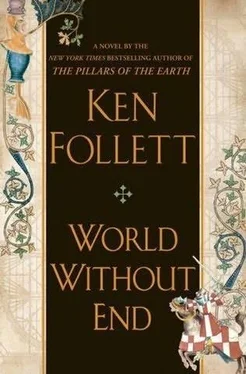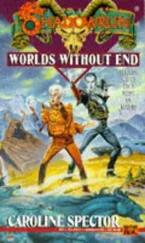She looked thoughtful. “I wish I could tell him – but would it be for his sake, or ours? For ten years he’s believed Ralph to be his father. Two months ago he wept at Ralph’s graveside. It would be a terrible shock to tell him now that he is another man’s son.”
They were speaking in low voices, but Caris could hear, and she said: “I agree with Philippa. You have to think of the child, not of yourself.”
Merthin saw the sense of what they were saying. It was a small sadness on a happy day.
“There is another reason,” Philippa said. “Gregory Longfellow came to see me last week. The king wants to make Gerry earl of Shiring.”
“At the age of thirteen?” Merthin said.
“The title of earl is always hereditary, once it has been granted, although baronies are not. Anyway, I would administer the earldom for the next three years.”
“As you did all the time Ralph was away fighting the French. You’ll be relieved the king isn’t asking you to marry again.”
She made a face. “I’m too old.”
“So Roley will be second in line for the earldom – provided we keep our secret.” If something should happen to Gerry, Merthin thought, my son will become earl of Shiring. Fancy that.
“Roley would be a good ruler,” Philippa said. “He’s intelligent and quite strong-willed, but not cruel like Ralph.”
Ralph’s mean nature had been obvious at an early age: he had been ten, Roley’s age now, when he shot Gwenda’s dog. “But Roley might prefer to be something else.” He looked again at the carved wooden horse.
Philippa smiled. She did not smile often, but when she did it was dazzling. She was still beautiful, he thought. She said: “Give in to it, and be proud of him.”
Merthin recalled how proud his father had been when Ralph became the earl. But he knew he would never feel the same way. He would be proud of Roley, whatever he did, as long as he did it well. Perhaps the boy would become a stonemason, and carve saints and angels. Perhaps he would be a wise and merciful nobleman. Or he might do something else, something his parents had never anticipated.
Merthin invited Philippa and the boys to dinner, and they all left the cathedral precincts. They walked over the bridge against the flow of loaded carts coming to the fair. They crossed Leper Island together and went through the orchard into the house.
In the kitchen they found Lolla.
As soon as she saw her father, she burst into tears. He put his arms around her and she sobbed on his shoulder. Wherever she had been, she must have got out of the habit of washing, for she smelled like a pigsty, but he was too happy to care.
It was a while before they could get any sense out of her. When at last she spoke, she said: “They all died!” Then she burst into fresh tears. After a whiie she calmed down, and spoke more coherently. “They all died,” she repeated, suppressing her sobs. “Jake, and Boyo, Netty and Hal, Joanie and Chalkie and Ferret, one by one, and nothing I did made any difference!”
They had been living in the forest, Merthin gathered, a group of youngsters pretending to be nymphs and shepherds. The details came out gradually. The boys would kill a deer every now and again, and sometimes they would go away for a day and come back with a barrel of wine and some bread. Lolla said they bought their supplies, but Merthin guessed they had robbed travellers. Lolla had somehow imagined they could live like that for ever: she had not thought about how things might be different in the winter. But, in the end, it was the plague rather than the weather that brought the idyll to an end. “I was so frightened,” Lolla said. “I wanted Caris.”
Gerry and Roley listened with mouths agape. They idolized their older cousin Lolla. Although she had come home in tears, the story of her adventure only enhanced her in their eyes.
“I never want to feel like that again,” Lolla said. “So powerless, with my friends all sick and dying around me.”
“I can understand that,” Caris said. “It’s how I felt when my mother died.”
“Will you teach me to heal people?” Lolla said to her. “I want to really help them, as you do, not just sing hymns and show them a picture of an angel. I want to understand about bones and blood, and herbs and things that make people better. I want to be able to do something when a person is sick.”
“Of course I’ll teach you, if that’s what you want,” Caris said. “I would be pleased.”
Merthin was astonished. Lolla had been rebellious and bad-tempered for some years now, and part of her rejection of authority had been a pretence that Caris, her stepmother, was not really her parent, and need not be respected. He was delighted by the turnaround. It was almost worth the agony of worry he had been through.
A moment later, a nun came into the kitchen. “Little Annie Jones is having a fit, and we don’t know why,” she said to Caris. “Can you come?”
“Of course,” Caris said.
Lolla said: “Can I go with you?”
“No,” said Caris. “Here’s your first lesson: you have to be clean. Go and wash, now. You can come with me tomorrow.”
As she was leaving, Madge Webber came in. “Have you heard the news?” she said, her face grim. “Philemon is back.”
*
On that Sunday, Davey and Amabel were married at the little church in Wigleigh.
Lady Philippa gave permission for the manor house to be used for the party. Wulfric killed a pig and roasted it whole over a fire in the yard. Davey had bought sweet currants, and Annet baked them in buns. There was no ale – much of the barley harvest had rotted in the fields for want of reapers – but Philippa had sent Sam home with a present of a barrel of cider.
Gwenda still thought, every day, about that scene in the hunting lodge. In the middle of the night she stared into the darkness and saw Ralph with her knife in his mouth, the hilt sticking out between his brown teeth, and Sam’s sword nailing him to the wall.
When she and Sam had retrieved their weapons, pulling them grimly out of Ralph, and the corpse had fallen to the floor, it had looked as if the two dead men had killed one another. Gwenda had smeared blood on their unstained weapons and left them where they lay. Outside, she had loosened the horses’ tethers, so that they could survive for a few days, if necessary, until someone found them. Then she and Sam had walked away.
The Shiring coroner had speculated that outlaws might have been involved in the deaths, but in the end had come to the conclusion Gwenda expected. No suspicion had fallen on her or Sam. They had got away with murder.
She had told Sam an edited version of what had happened between her and Ralph. She pretended that this was the first time he had tried to coerce her, and she said he had simply threatened to kill her if she refused. Sam was awestruck to think that he had killed an earl, but he had no doubt that his action had been justified. He had the right temperament for a soldier, Gwenda realized: he would never suffer agonies of remorse over killing.
Nor did she, even though she often recalled the scene with revulsion. She had killed Alan Fernhill and finished Ralph off, but she had not a twinge of regret. The world was a better place without both of them. Ralph had died in the agony of knowing that his own son had stabbed him through the heart, and that was exactly what he deserved. In time, she felt sure, the vision of what she had done would cease to come to her by night.
She put the memory out of her mind and looked around the hall of the manor house at the carousing villagers.
The pig was eaten, and the men were drinking the last of the cider. Aaron Appletree produced his bagpipes. The village had had no drummer since the death of Annet’s father, Perkin. Gwenda wondered whether Davey would take up drumming now.
Читать дальше












